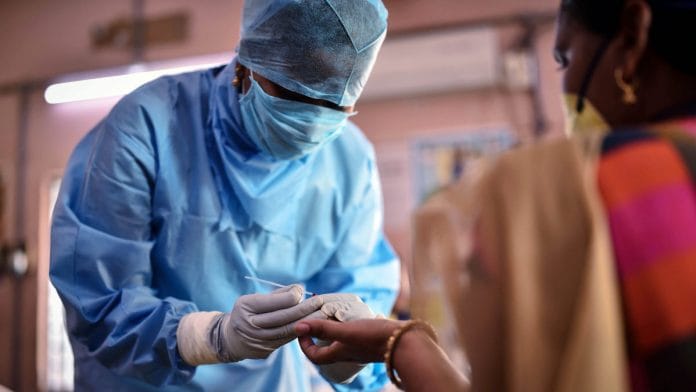Bengaluru: Antibody tests are becoming popular amid the second wave of the Covid-19 pandemic in India because a lot of people suspect they have contracted the virus, or are curious to measure their levels after vaccination.
Additionally, many labs are advertising their antibody tests at various costs by saying they indicate “protection” or “immunity” against the virus in the future.
Medlife Launches COVID Antibody Test!!
Now check if you are immune to COVID-19 at Rs.600.
Book Now. Call/SMS YES on 7259197741
NOT for COVID-19 diagnosis. T&C* @ICMRDELHI
— Malini Aisola (@malini_aisola) July 6, 2020
However, this is untrue — antibody tests in the market do not provide information about protection from future infection. They are only capable of detecting past infections or immune response from vaccination. According to America’s apex medical body CDC, antibody tests are useful only for epidemiological and serological purposes, and not for diagnosis, determining protection, or resuming socialisation.
ThePrint looks at different types of antibody tests, what they measure, and why they cannot predict the future.
Also read: What are Covid antibody titer tests and why they are important during vaccination drive
How antibodies work, and how they are measured
When a person gets infected, the first antibody produced as the immune system kicks into action is ‘IgM’. These start to be produced about a week into the infection, reach peak levels at three weeks, and decline very quickly, at which point, ‘IgG’ antibodies start to get produced. These are the more important antibodies that are responsible for protection, especially in the long term. These antibodies climb in levels from four to eight weeks after infection. Subsequently, they decline comparatively slowly.
IgM and IgG are ‘binding’ antibodies which physically bind their Y-shaped structure to the proteins on the virus, flagging it and causing macrophage cells to destroy it. They can also attract natural killer cells to come and destroy cells that are infected with the virus. They simply act as markers and may not interfere with the infectivity of the virus.
A subset called ‘neutralising’ antibodies can affect the virus’ ability to infect cells by preventing it from undergoing the structural changes required to enter a host cell. Protection against infections occurs in the form of blocking viral infection and/or replication.
For Covid-19, at the moment, it is not known which antibody protects against the virus, and to what extent, but experts say it is likely to be neutralising antibodies. A majority of neutralising antibodies are IgG.
Antibody tests in the market today indicate the presence of IgM or IgG antibodies, and sometimes IgA, which are produced after IgM and play a key role in protecting mucous membranes around the body. These antibodies, in turn, reveal past exposure or immune response after vaccination. These tests measure binding antibodies, and are used in sero-surveys to measure exposure.
There is no standardised test available today that can measure neutralising antibodies, and thus, protection.
Types of antibody tests
The ‘sensitivity’ of a test is its ability to pick up antibodies, while its ‘specificity’ is the ability to pick up the correct antibodies produced in response to the SARS-CoV-2 virus (and not other coronaviruses). A low sensitivity provides false negatives, while a low specificity gives false positives.
Antibody tests for SARS-CoV-2 have a low specificity within the first week of exposure and increase in the second and third weeks. Many antibody tests have a high false negative rate and studies evaluating them tend to have a high risk of bias for participant selection, thus incorrectly reporting the accuracy of such antibody tests.
There are four major types of antibody tests: Rapid diagnostic tests (RDT), which are growing in popularity; enzyme-linked immunosorbent assays (ELISA), neutralisation assays, and chemiluminescent immunoassays. The non-rapid tests are all lab-based and require at least 2-3 days for processing.
Rapid tests detect antibodies against antigens or the four structural proteins of the virus —spike (S), envelope (E), membrane (M) and nucleocapsid (N) — within minutes. Of these, S and N are considered to be more immunogenic, or able to invoke an immune response.
A vaccine such as the Serum Institute of India-manufactured Covishield, which uses the spike protein of the virus inside an adenovirus vector, induces production of antibodies against the spike protein, while Bharat Biotech’s indigenous Covaxin, which uses an inactivated SARS-CoV-2 virus, produces antibodies against the entire virus, including the spike.
Not everyone who is vaccinated or has had Covid-19 produces an immune response measurable by antibody tests.
(Edited by Shreyas Sharma)
Also read: Itolizumab to Tocilizumab — Why monoclonal antibody therapies are in focus & how they work






